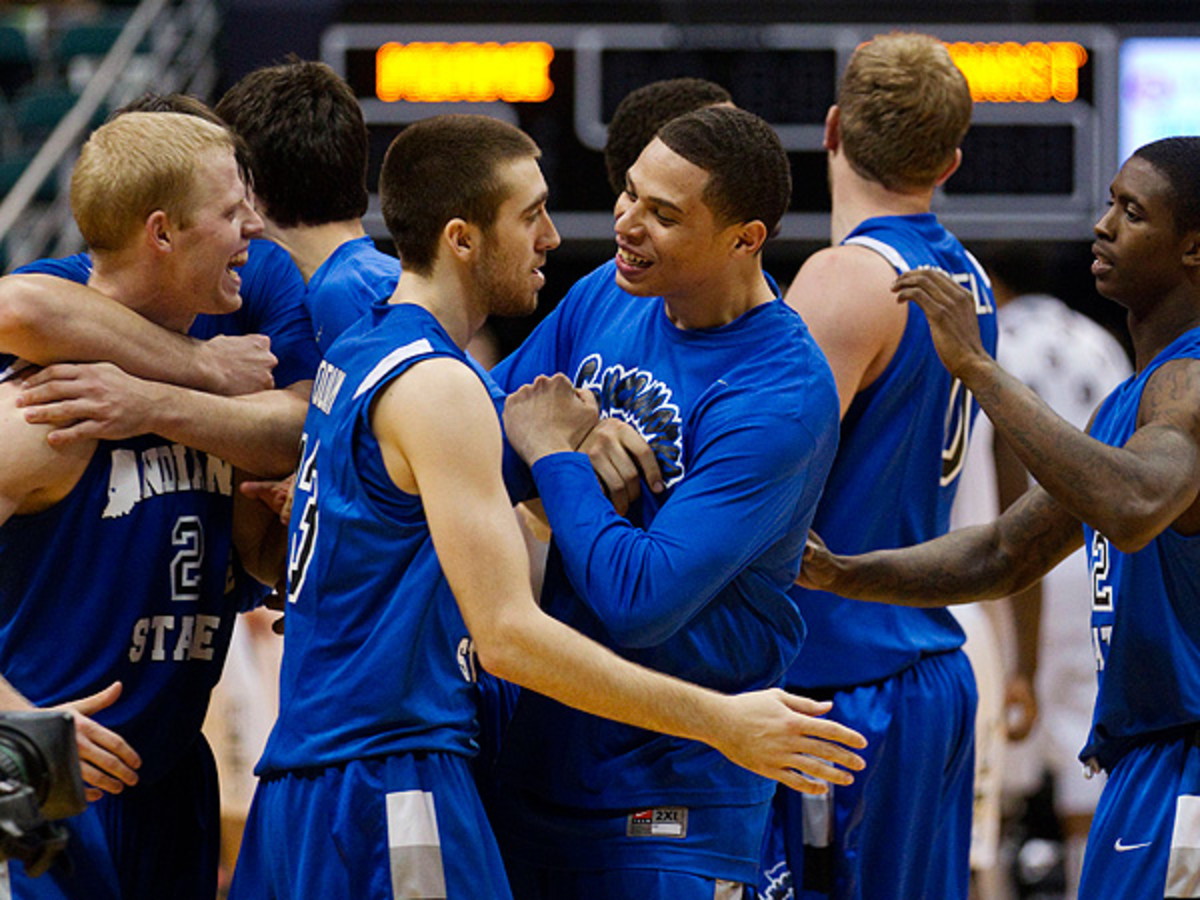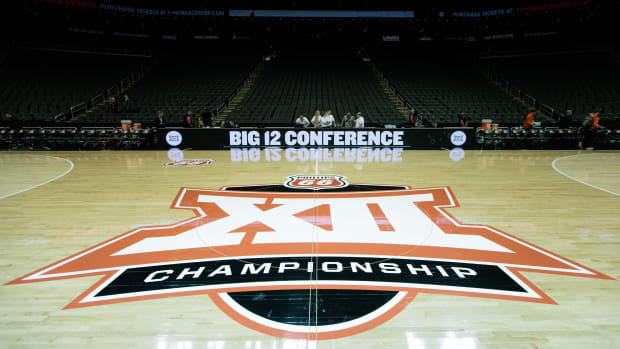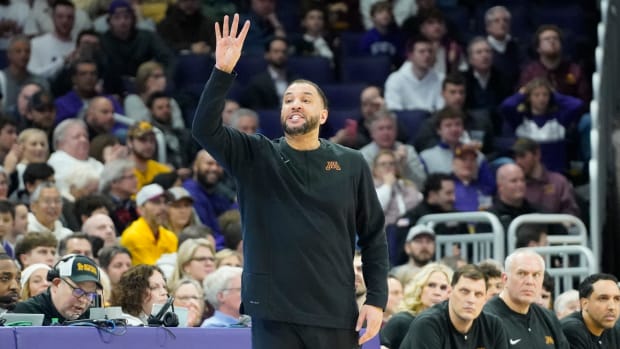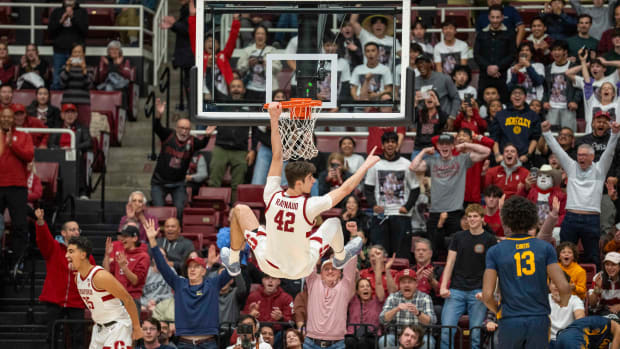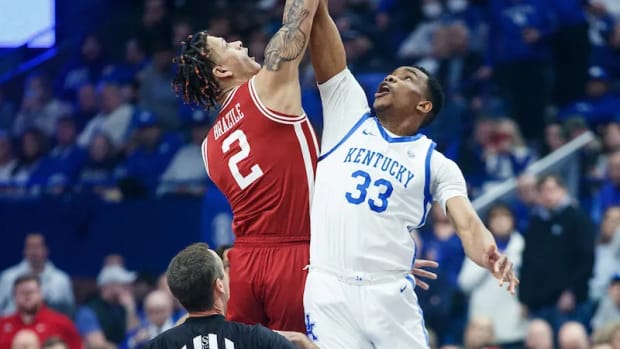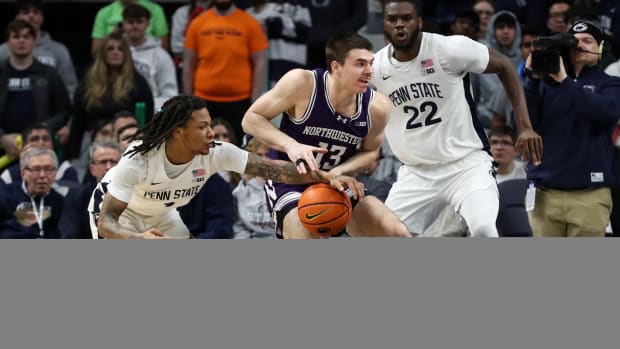It's 2013, and leagues still need help with scheduling
Indiana State's Christmas Day win over Miami ultimately gave the Sycamores a nice boost in the RPI.(Eugene Tanner/AP)
The primary news out of the SEC spring meetings on Tuesday was the decision to seek out a permanent venue for the annual SEC basketball tournament. Well, that was the news that attracted the most attention, but buried right near the end of that column from Yahoo!'s Pat Forde linked above was something more noteworthy.
Slive said there also was discussion with basketball coaches about non-conference scheduling, as the league attempts to improve sagging RPI numbers. The SEC has hired former NCAA tournament guru Greg Shaheen to assist in scheduling, and Shaheen is in Destin to meet with the league’s coaches.
The first of those two sentences is a good thing for the league. These kinds of discussions go on across conferences at every level of the Division I pyramid. Individual programs are becoming more attuned to the impact their league has on their own RPIs, their ability to collect top-50 wins and cobble together viable NCAA at-large profiles.
It's the second one that caused a pause and then a heavy chuckle. Greg Shaheen is tremendously smart and, as former overseer of the NCAA tournament, as good a resource as you can find to educate you on matters related to at-large profile building. He was in the committee room, helping to enable the entire selection and bracketing process.
But holy heck, guys. It's 2013. You still haven't figured out how to schedule to game the RPI??! This isn't like trying to replicate the recipe for Coca-Cola. It's simple, flawed math that's exploitable.
If you want details, they're available in a lot of places, including this very location two months ago, in response to Cuonzo Martin's end-of-season spin. But since the SEC still seems to be struggling with how exactly this all works, here are the CliffsNotes:
1) Don't schedule terrible teams. Ever.
2) Don't lose at home. Ever.
Magic! You suddenly have a lot of top-50 RPI teams in your league and then you can get all those precious top-50 wins the committee craves (even though a team's RPI has nothing to do with the selection process, wink wink).
You know what? If your favorite conference's administrators made it this far in the column, I'll toss in some more specific bonus help.
1) Don't schedule SWAC teams.
You're paying to destroy your own RPI. That's stupid. You can find teams that are 100 RPI spots better in expectation, maybe pay them less in guarantee money, and win by 18 instead of 34. Margin of victory doesn't matter to the committee. Blasting horrible teams doesn't matter to them, either. The chance of losing to a team below 200 in the RPI for a legitimate program is almost nil (unless you're Kansas at TCU). Fans don't want to watch 91-53 games, either.
It's lose-lose-lose except for the SWAC team that's cashing your check. They have every right to fund their athletics programs like that, but you don't have to enable it while hurting yourself in the process. Note: This rule applies to any horrible team from weak leagues that's solely out for a check. You can do better if you try.
2) Spend 15 minutes figuring out the best teams in smaller leagues, and schedule them.
Were they good last year and are returning a number of players? Great, sounds like a winner. If you schedule multiple teams like that, you'll likely average out to exactly the level you were hoping to get from that group of nonleague opponents. Some will exceed expectations and some will fall short. You can pick teams at various levels of expectation based on how good you think you'll be.
If you're really confident? Bring in Harvard. The Crimson are a near lock to win 25 games next season, and they're also rather unlikely to win at a top-20 team's gym. If you are comfortable with your point guard and overall ballhandling, invite A-10 power VCU in for a game. The Rams can't beat a good team if they can't turn you over. Just look around. There are teams in every conference in America that will win 20 games or more, and almost none of them will be a major problem for you in your own gym.
3) Play neutral-site games that aren't neutral
Duke is the master of this strategy, regularly racking up quality wins in venues in the New York City area. Kansas plays in Kansas City. Oklahoma State is looking for a game in Oklahoma City this season. Neutral site wins are worth a full win in the RPI Factor I adjustment. Home wins are worth 0.6. That 67 percent increase in value is worth the slight competitive risk of playing outside your campus gym (assuming you work out the money issues in your favor).
4) MTE consolation games can have huge value
At the time, virtually no one paid attention to the third-place game in the Diamond Head Classic last season. Miami (Fla.), without Reggie Johnson, took on Indiana State on Christmas Day as an opening act to the highly-anticipated Arizona-San Diego State title game. The Hurricanes played like they didn't want to be spending their holiday in a gym. The game was horrible. The Sycamores eked out a two-point win. Three months later, Miami was the ACC double champ and a 2-seed in the NCAAs, and that "whatever third-place game" was a massive resume chip for the Sycamores.
You never know how things are going to unfold. You enter multi-team events to get a guaranteed number of games. Take advantage of them, even if you're not shooting for a tournament title. It works both ways. You can eat a bad loss in a throwaway game that can come back to haunt you.
